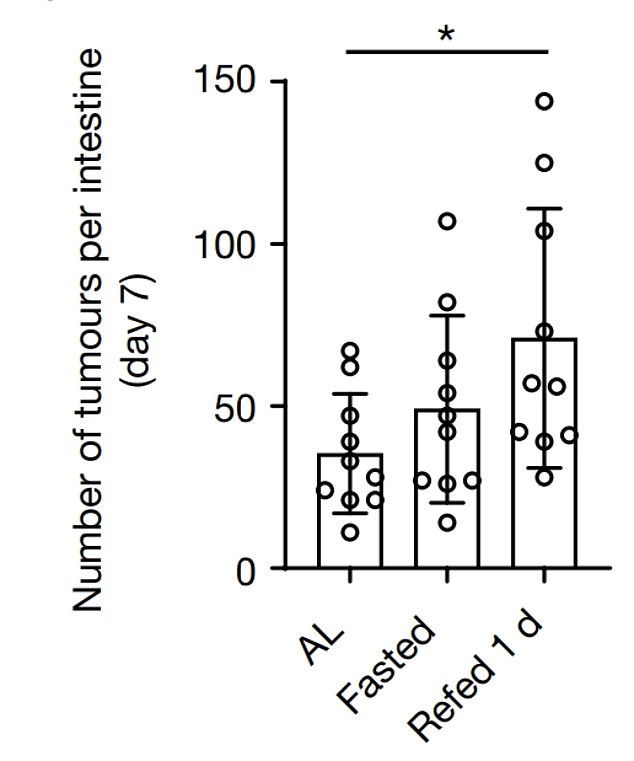Fasting like Mark Wahlberg does could cause cancer, preliminary research suggests.
In a study in mice, researchers found that rodents that fasted for 24 hours before eating had a “profound” risk of precancerous tumors forming in their gut.
This may be because the “refeeding” stage causes cells in the intestines to become overactive, increasing the risk of cancer-causing mutations.
Dr. Omer Yilmaz, a biologist at MIT who led the study, cautioned that the study was not conducted in humans, so it cannot be directly compared to people.
But he said the results suggest that those trying intermittent fasting should avoid foods like red meat and charred steaks, which are increasingly linked to the colon cancer epidemic in young people..
Mark Wahlberg, 53, is one of those who swear by this diet: he eats only within a six-hour window starting at 12 noon every day. (Pictured above, in Barbados, in 2019)

This graph shows that mice that fasted for 24 hours and then ate food were more likely to have tumors in their intestines.
Dr Yilmaz said: “I want to emphasise that this was all done in mice, using very well-defined cancer mutations. In humans it’s going to be a much more complex situation.
‘But this brings up the next idea: Fasting is very healthy, but if you’re unlucky and you eat again after a fast and you’re exposed to a mutagen, like a charred steak or something, you could actually be increasing your chances of developing a lesion that can lead to cancer.’
Intermittent fasting has been surrounded by a health halo since it became popular in the 2010s. More than one in ten Americans follow this diet.
The diet involves a person limiting their caloric intake to certain times of the day or days of the week in order to lose weight and control eating habits.
Popular iterations include the 14:10 plan, where a person only eats within a 10-hour period, and the 5:2, where someone eats five days a week and fasts two.
Among the celebrities who have opted for the diet was Jennifer Aniston, who revealed in 2019 that she only drinks water in the morning, saving her first meal until midday.
Mark Wahlberg is also a proponent of the diet and limits himself to eating only between 12 and 6 p.m. every day.
Many have been drawn to the diet for its benefits, with studies linking it to weight loss, improved concentration and even a longer life.
But Experts are also beginning to uncover a wave of potential dangers associated with the diet.
Others have also suggested that the diet is detrimental to the immune system and may increase the risk of infections and heart disease.
In the new article, published in the journal NatureThe scientists analyzed three groups of mice.
One group fasted for 24 hours and then ate whatever they wanted, another group fasted for 24 hours and did not eat, and a third ate whatever they wanted throughout the entire process.

Fasting diets favoured by celebrities may increase the risk of heart disease and cancer, an independent study suggests (file photo)
The scientists also extracted stem cells from the intestines of the mice during the experiment.
Intestinal stem cells are among the most active cells in the body, dividing regularly and rapidly to replace the intestinal lining every five to ten days.
They are also one of the most common sources of precancerous cells.
The results showed that cells multiplied more rapidly in the fasting group after ending their 24-hour fast.
In a separate experiment, the team turned on cancer-causing genes that made mice more likely to develop tumors.
They found that mice that fasted and then ate had a higher risk of developing precancerous polyps in their intestines than mice that ate normally or only fasted.
Dr Shinya Imada, a biologist who was also involved in the research, added: ‘We believe that fasting and refeeding represent two distinct stages.
‘In the fasting state, the ability of cells to use lipids and fatty acids as an energy source allows them to survive when nutrients are low.
‘And then it’s the post-fasting refeeding state that really drives regeneration.
‘When nutrients are available, these stem cells and progenitor cells activate programs that allow them to build cell mass and repopulate the intestinal lining.’

